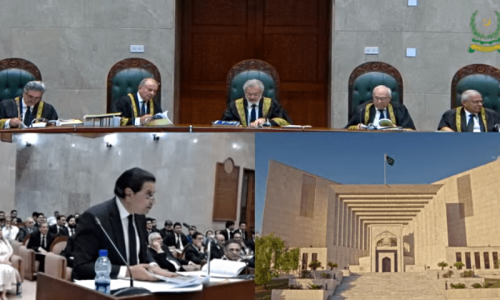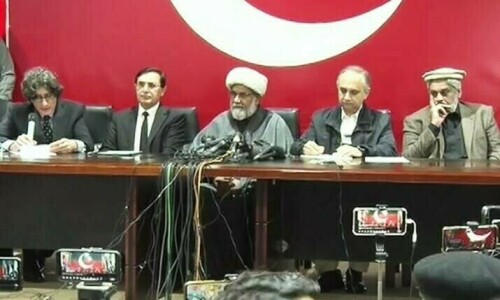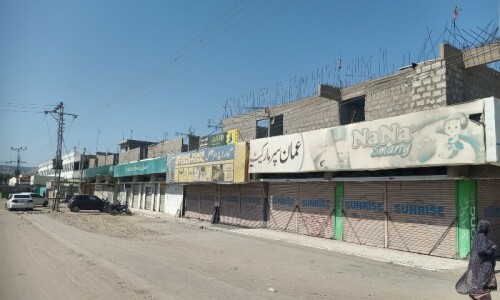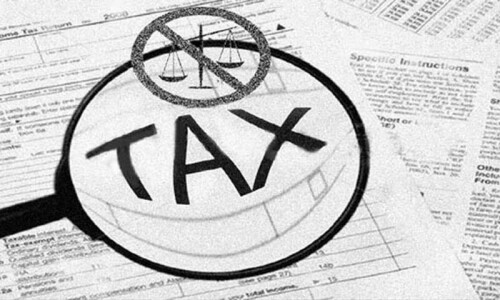• Top judge notes court can only intervene if commission crosses constitutional boundaries
• Says apex court won’t review conduct of polls unless it is presented with specific case concerning rigging
• SC asks ECP to calculate reserved seats with and without independents, to understand impact on election results
ISLAMABAD: Amid intense questioning, Chief Justice of Pakistan (CJP) Qazi Faez Isa came to the rescue of the Election Commission of Pakistan (ECP) on Monday by reminding that the commission was not a subordinate institution to the Supreme Court or the government but an independent authority conferred with a constitutional role to conduct elections.
The Supreme Court can only exercise its jurisdiction if it is convinced that the commission has gone beyond its constitutional role, the CJP highlighted, pointing out that ideally, all institutions should function within their own prescribed domain. The CJP was heading a full court of the Supreme Court hearing a set of appeals by the Sunni Ittehad Council (SIC) against the denial of reserved seats to women and non-Muslim candidates.
The Supreme Court ordered the ECP to do a calculation by applying the formula of allotting reserved seats among political parties on the basis of the election results of 2018 by excluding, as well as including, independents to understand the difference. The bench intends to understand the actual calculations of allocation of reserved seats applied to the results of the Feb 8, 2024, elections.
“Unfortunately, we go to the minutest of details as if we are sitting as an appellate court of ECP,” the CJP regretted, adding that unless the Supreme Court was seized with a particular case regarding actual rigging in elections at the lower level, the apex court could not review the conduct of the elections.
Not one election in the country has ever been accepted or got popular approval since the losing parties have always painted elections as sham or riddled with rigging because we don’t respect the institutions, Chief Justice Isa regretted.
Unlike judges, who were appointed by the Judicial Commission of Pakistan, the CJP reminded, the heads of the ruling and opposition parties in parliament appoint the chief election commissioner after consultations.
“We may have differences with the conduct of the commission, but we will interfere only when ECP deviates from the Constitution and the law,” the CJP emphasised, adding the Constitution was written for the people of Pakistan and not for lawyers or judges. Judgements should be written in a way that even a matriculation student could understand them.
During the hearing, Justice Athar Minallah observed that the entire premise of Article 51 of the Constitution was political parties, but the real question that needed to be addressed was whether the ECP, on the basis of misinterpretation of some judgments (Jan 13, 2024 judgment on denial of common election symbol bat to PTI), and eliminate a political party from the elections.
The calculation of the party position, Justice Minallah said, would come later but the fundamental question in the entire case was the act of ECP of eliminating a major political party.
Justice Ayesha A. Malik regretted that it appeared as if the formula to allocate reserved seats has been left at the hands of ECP to do as they choose by declaring some as independents and others as political parties because that’s what the court had been hearing for the last few days.
Attorney General for Pakistan (AGP) Mansoor Usman Awan replied the point of view of the petitioners was that since they have joined a political party (SIC) therefore that it should be treated as a political party and be allotted reserved seats.
ECP’s arguments
Earlier, ECP lawyer Sikandar Bashir Mohmand argued that the party affiliation certificates as well as the list of candidates for the reserved seats under Section 66 of the Elections Act 2017 were signed by Gohar Ali Khan as the PTI chairman. But then ECP did not recognise the organisational structure of the party on account of the PTI not having conducted intra-party elections in accordance with Section 208 read with 209 of the Elections Act.
The counsel conceded that the dates of party affiliation certificates furnished by SIC candidates were Jan 13, 2024, though not all certificates were issued on the same date. Therefore the certificates were defective and void and had no sanctity in law, he said.
The ECP order against the PTI was issued on Dec 22, 2023, the counsel said, adding the Peshawar High Court (PHC) by upholding ECP’s decision of denying the election symbol came on Jan 10, 2024.
Referring to Sahibzada Hamid Raza, the counsel said that admittedly being chairman of SIC, he should have opted to issue an SIC party affiliation certificate to himself and upon issuing the certificate could have contested the elections as a SIC candidate.
Had this been done and had he won the elections, the requirement of ECP for having elected to least one seat in the general elections would have been met. But for reasons best known to him, this was not done, said the counsel.
Justice Malik referred to the application filed by Advocate General Khyber Pakhtunkhwa that ECP allocated reserved seats to the Balochistan Awami Party in 2019 when the party neither contested the polls from Khyber Pakhtunkhwa nor submitted a list of candidates for the reserved seats for women.
The counsel highlighted that the decision was made in view of the peculiar situation after the 25 Amendment when the ex-Fata areas were merged with KP.
At this Justice Malik regretted that ECP was taking decisions on the basis of understanding of the laws as it chose to understand the laws. There must be some consistency, Justice Malik said, adding it seems the commission was pulling something out of a hat.
The counsel however said that the decision was per incurium and there was no detail to this decision.
PTI Chairman Gohar Ali Khan said he had filed two nomination papers one as an independent candidate and the other as a PTI candidate. He claimed that ECP had concealed the majority of the records from the court, he said.
Published in Dawn, July 2nd, 2024















































